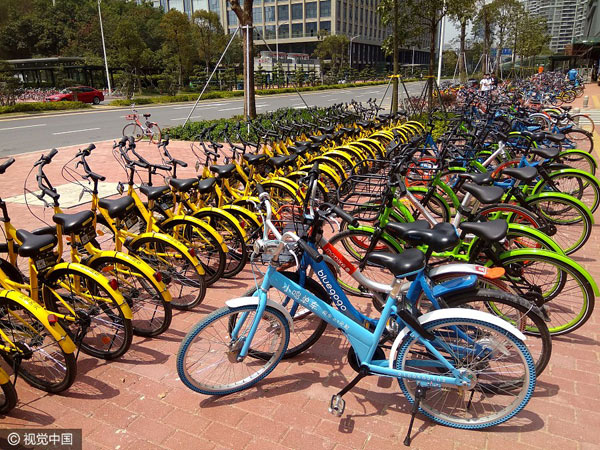Shenzhen: Police to restrict shared bikes to prevent congestion, chaos
 |
|
Various bicycles are parked at a subway entrance in Shenzhen, Guangdong province, April 4, 2017. [Photo/VCG] |
SHENZHEN - China is known to impose some of the world's toughest car driving restrictions, and now the checks and controls are expanding to the bike-sharing industry.
Police in southern metropolis Shenzhen Friday said they were mulling restrictions on the use of shared bikes, especially during holidays, to ward off road congestion and potential public chaos.
Police said about 520,000 bikes had been put on the streets in the city in just a year since bike sharing began.
A growing number of people take the colorful two-wheelers to work or just for fun. In the recent tomb-sweeping holiday, however, paths in a local park became seriously clogged with bikes. Careless parking of shared bikes often blocks traffic.
Police said they are now partnering with bike sharing firms to launch a joint command to monitor the number of bikes in designated areas to prevent congestion or chaos on the road.
According to the plan, if the accumulation of bikes in a certain area hits a certain number, a warning system will be activated that blocks bikes entering, with cyclists notified via a mobile app.
A limitation or ban on the number of bikes will be also enforced in certain public places during peak seasons.
Police said bike-sharing firms should be held responsible if their negligence leads to serious road accidents. The firms have been ordered to report to police the number of bikes to be released in key areas before holidays.
The bike sharing business took off in China less than two years ago after startups lured investment to use Internet technology to transform the mobility sector.
Riders spend as little as one yuan ($0.15) per hour after unlocking bicycles with a mobile app, and they can drop them off anywhere for the next user. Mobike, Bluegogo and Ofo are among the major companies.
According to Beijing-based think tank analysis, there were 18.86 million users of shared bicycles nationwide at the end of 2016. The number is expected to hit 50 million by the end of 2017.

















